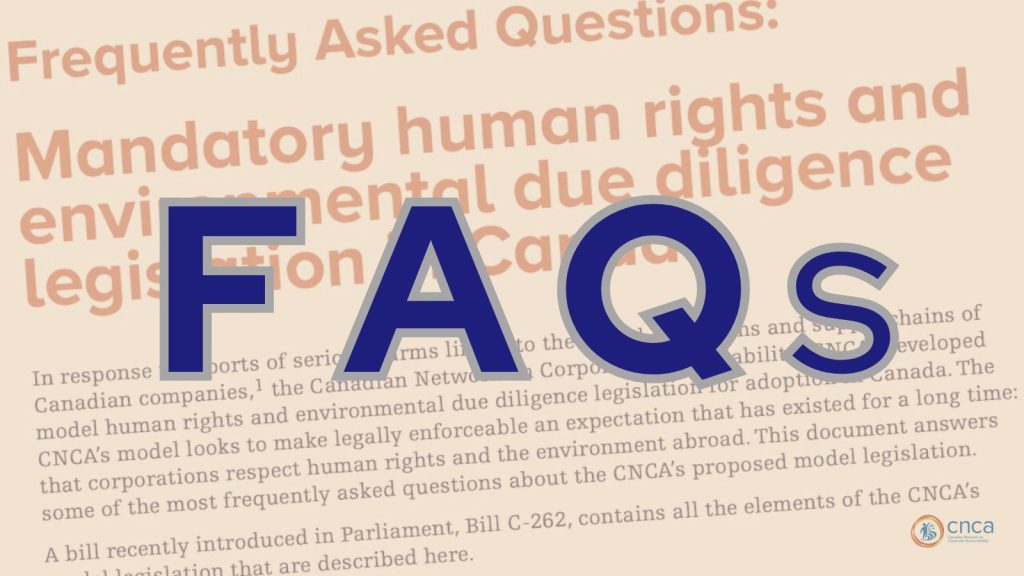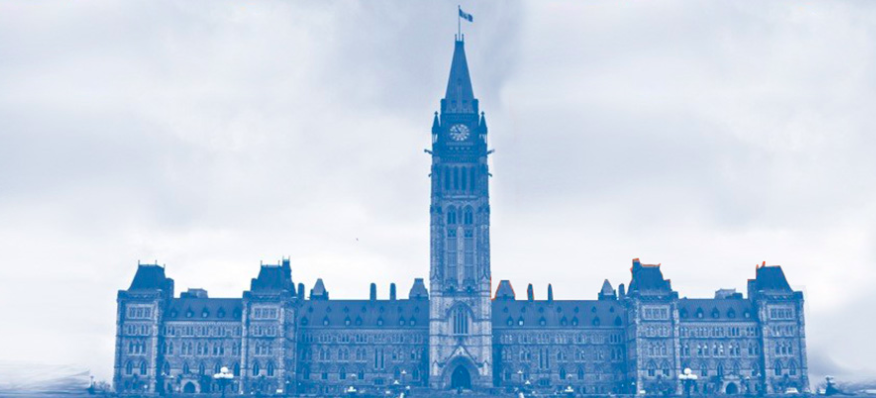In response to reports of serious harms linked to the global operations and supply chains of Canadian companies, the Canadian Network on Corporate Accountability (CNCA) developed model human rights and environmental due diligence legislation for adoption in Canada. (These harms have been frequently reported in relation to Canadian companies’ own operations and their business with other firms, for instance suppliers who produce goods that the company imports to Canada.) The CNCA’s model looks to make legally enforceable an expectation that has existed for a long time: that corporations respect human rights and the environment abroad. This document answers some of the most frequently asked questions about the CNCA’s proposed model legislation.
A bill recently introduced in Parliament, Bill C-262, contains all the elements of the CNCA’s model legislation that are described here.
1. Why do we need such a law in Canada?
Despite knowing for decades that Canadian companies and supply chains are contributing to human rights abuse and environmental damage abroad, the Canadian government continues to rely on voluntary measures to encourage responsible business conduct. Experience shows these measures are ineffective. As companies continue to profit from abuses they either cause in their own operations or contribute to through their supply chains, it is increasingly clear that many will only change their behaviour if required to do so by law.
2. What is human rights and environmental due diligence?
Human rights due diligence is a process undertaken by a company to prevent and address harmful impacts on people and communities throughout its operations and supply chains. It involves carefully assessing the risk of harm, doing what’s needed to minimize the risk and remedy any existing harm, and accounting for the steps taken. To do this effectively, a firm needs to engage in environmental due diligence to address any ecological harm that would put people’s rights at risk — including the right to a safe, healthy and sustainable environment. As the law proposed by CNCA would explicitly protect this right, we refer to it as a human rights and environmental due diligence law.
3. What would the law require that companies do?
The law would require companies to prevent and remedy human rights abuse by developing and implementing effective due diligence procedures. These would have to address the human rights impacts outside Canada of the company’s own activities, those of its affiliates, and those of other firms it does business with. This would include harms caused by the company’s subcontractors and suppliers, for instance in producing goods that the company imports to Canada. Companies would have to consult with rights-holders and report annually on these steps.
4. How would this legislation help people harmed by Canadian companies overseas and prevent further abuse?
The law would establish an explicit right for people harmed by Canadian companies abroad to seek remedy by filing a civil lawsuit in Canadian courts. The court could order the company to cease harmful activities and/or compensate the victims. The possibility of legal action would provide a powerful incentive for companies to make sure people aren’t harmed in the first place. Furthermore, the requirement to consult on an ongoing basis with rights-holders would also create a strong impetus for firms to identify risks and take effective preventative action.
5. What companies would be covered by the CNCA’s model law?
The CNCA’s model legislation would apply to companies that are incorporated in Canada, have a place of business in Canada, or sell goods or services in Canada and have a physical presence or otherwise carry out business in Canada. The CNCA’s model would allow for small businesses in low-risk sectors to be exempted through regulations.
6. Do other countries have similar laws?
France, Germany and Norway have adopted laws that impose human rights due diligence requirements on companies. The French “duty of vigilance” law was the first law of this kind to come into force. It requires companies to establish, implement and report on an annual vigilance plan, which must include steps to prevent harm. The law also provides for harmed individuals to bring a civil lawsuit to seek damages from a company that has failed to comply with its obligations. Several other countries, and the EU, are currently advancing mHREDD laws. You can learn more about examples from Europe with this table from the European Coalition for Corporate Justice.
7. Can’t people harmed by Canadian companies abroad already seek justice in Canadian courts?
People can and have filed lawsuits in Canada seeking to hold Canadian companies to account for human rights abuse abroad. There are significant barriers, however, to pursuing this kind of litigation. Victims may face years of legal battle just to establish that the case should be heard in Canada. Courts are generally reluctant to hold a Canadian parent company liable for harms caused by a subsidiary company through which it operates overseas. The law proposed by the CNCA would remove these barriers, making it easier for victims to access justice.
8. Do they have any other recourse to seek remedy in Canada?
The Canadian government has two complaints and mediation offices that people affected by Canadian firms’ activities abroad can appeal to. In theory, either of these offices could oversee mediation in which the firm voluntarily agrees to take remedial action. In practice, this has been a rare outcome in cases handled by the National Contact Point (NCP), which has been in place for over two decades. Communities and workers have found that complaints to the NCP have yielded no improvement to their situation, and have sometimes even made it worse. The newer office, of the Canadian Ombudsperson for Responsible Enterprise, has not been provided with the basic minimum powers required to do its job. Impacted communities have been advised to approach the office with caution, if at all.
9. How would the law be enforced?
The CNCA’s model law would establish a right for those who suffer harm to file a civil lawsuit in a Canadian court. The court could order the firm to cease its harmful activities, pay compensation to the victims, or take any other actions needed to prevent or remedy harm, arising from its own activities or those of its subsidiaries, subcontractors or affiliates. An interested person or party (e.g. an organization) would be able to seek a similar court order if a Canadian company failed to adequately develop, implement and/or report on its due diligence procedures. A company could seek to defend itself against such an order by demonstrating that it implemented effective due diligence procedures.
10. Under this law, would Canadian companies be criminally prosecuted for human rights abuses linked to their overseas operations?
No. The requirement that companies prevent human rights abuse would be enforced through civil lawsuits in Canada. These could be filed by people affected by the business activities and relationships of Canadian companies, or by other interested parties on their behalf, such as partner organizations. Some human rights violations amount to a criminal offence. Nothing in the legislation would prevent a victim of crime from seeking criminal law enforcement. Prosecution for corporate crimes, especially transnational corporate crimes, remains challenging and rare. This legislation will not address those challenges.
11. How is the CNCA’s model legislation different than “modern slavery” legislation being discussed in the Senate?
The proposed modern slavery reporting law for Canada (Bill S-211) does not require companies to stop using child or forced labour or to conduct human rights due diligence. If passed, Bill S-211 would only require companies to report on what steps, if any, they have taken to prevent and reduce the risk of forced or child labour in their supply chains. Supply chain legislation should focus on preventing and remedying harm, not just reporting. Bill S -211 is flawed because it would only apply to a small minority of companies, it ignores some of the most egregious human rights abuses, and it has an ill-placed focus on reporting. (See the CNCA’s analysis here.)
In contrast, the CNCA’s model legislation would require companies to prevent human rights violations, including those caused by environmental damage, throughout their global operations and supply chains. It accomplishes this by requiring companies to develop and implement adequate human rights due diligence procedures, consult with rights-holders, and report annually.
12. How would this legislation complement a strengthened Canadian Ombudsperson for Responsible Enterprise?
People harmed by Canadian companies should have access to both effective out-of-court mechanisms and access to courts. Complaint processes through an effective ombudsperson can be quicker, cheaper and provide impacted communities with more agency, but the ombudsperson’s recommendations for remedy are not binding for companies. The law proposed by the CNCA would complement this out-of-court ombudsperson by requiring companies to prevent human rights abuse and environmental damage in the first place, and by helping people harmed by Canadian companies, their subsidiaries and/or subcontractors to access justice in Canadian courts.
13. Why doesn’t the law apply to human rights and environmental impacts caused by corporations inside Canada?
Business-related abuses occur both inside Canada and outside of Canada, and impacted people in Canada can also face challenges in accessing remedy and preventing harm. This is particularly the case for First Nations communities, environmental defenders and migrant workers. The challenges can differ in nature and scale as compared to impacted people seeking remedy for harms that occur outside of Canada.
The Canadian constitution grants the federal, provincial and territorial governments legal jurisdiction to regulate different activities. A law aimed at the overseas abuses of Canadian companies fits into the federal division of these powers. It is likely that a federal law that requires companies to undertake human rights and environmental due diligence inside Canada would be subject to a constitutional challenge—slowing down its coming into force and/or derailing its development entirely.




